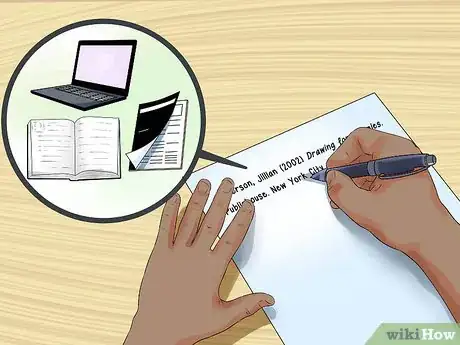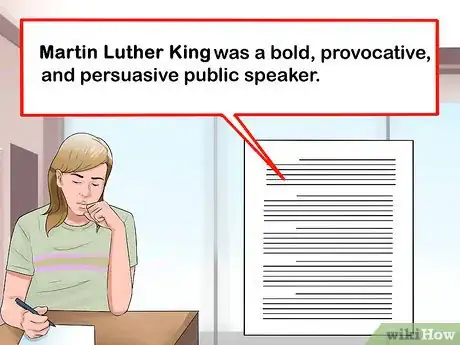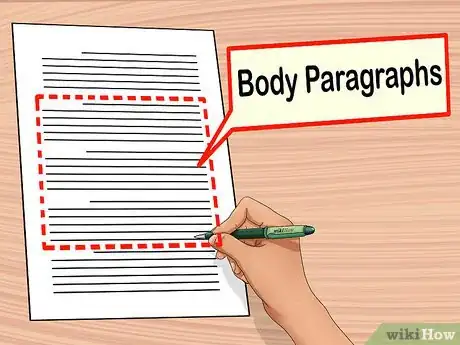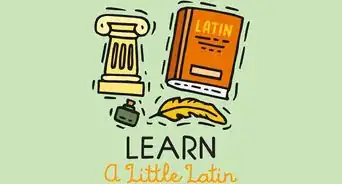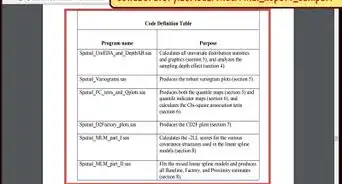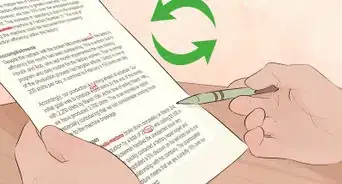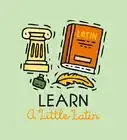This article was co-authored by Emily Listmann, MA. Emily Listmann is a private tutor in San Carlos, California. She has worked as a Social Studies Teacher, Curriculum Coordinator, and an SAT Prep Teacher. She received her MA in Education from the Stanford Graduate School of Education in 2014.
There are 8 references cited in this article, which can be found at the bottom of the page.
This article has been viewed 230,679 times.
Are you stumped about how to write a report on a famous person? Many times, just starting a project like this is half the battle and once you begin all the pieces will fall into place. You will just need to do a bit of research, organize the information you learned into general categories, and then write about each of those categories. You can write a report about anyone or anything with just a bit of time, organization, and focus.
Steps
Researching Your Topic
-
1Choose a person if one has not been assigned to you. If you are able to write any a famous person of your choosing, find out which famous people interest you most. For instance, you may be fascinated by people who have invented helpful items (like Marie Curie or Henry Ford), famous political figures (such as Winston Churchill or Susan B. Anthony), or people who have devoted their lives to helping others (like Mother Teresa or Mahatma Gandhi).
- If you must choose someone from a specific time period, search for historical figures from that era and read about them until you find one that interests you.
- You could also choose someone based on a topic. For instance, if you’re interested in electricity, you could pick Nikola Tesla, Michael Faraday, or James Prescott Joule.
-
2Do a basic Internet search about the person. If you don't know anything about the person you are going to write about, it makes sense to do a basic online search of their name, so that you understand the basics of who they are. Pick your favorite Internet search site and look the person up simply by typing in their name.
- For most reports, this preliminary search won't give you sources that you want to cite in your paper. Instead, it'll give you the basic information you'll need to do a more in-depth search for credible sources.[1]
- Try not to cite sources in your paper that are created by non-experts or are sources that can be edited by anyone. However, these can be great jumping off points for further research.
Advertisement -
3Go to the library and gather more information. Check out books from the library, search the library databases, and read newspaper or magazine articles. A good way to find out if you are finding all of the sources a library has to offer is to talk to a librarian about your project. They can steer you towards a wide variety of great and reliable sources.
- When researching the subject, be careful to evaluate the credibility of your sources. If possible, use a variety of reliable sources to get the best information about the subject.[2]
- As a general rule, you want information that has been created by experts on the person you are researching.[3]
-
4Take notes. It is one thing to read everything you find about a person, it's another to remember all that information and where you found it. This is why taking notes is so important. As you read a source, take notes about the important details. These notes will help you remember the information and they will be very important to refer to when you start to write your actual report. If you are quoting or paraphrasing information from a source, write down the source the information came from so you can cite it in your report.
- Write the name of the source, then list the pertinent information as you come across it. Be sure to note the page number(s) too.
- There are different ways to take notes, so you'll have to find one that suits you.
- Some people like to take notes on paper and some people like to type them in a computer. Do whichever you prefer.
-
5Find your focus. Any person's life cannot be completely covered by one class report. Instead, you will want to give your reader all the basic information about the person, but spend most of your time looking into one particular aspect of the person.
- For example, if you're researching Eleanor Roosevelt, you'll want to know when she was born, who her parents and her husband were, and why she's famous. However, you'll also want to focus on one aspect of her life, such as her work for women's rights.
- Alternatively, pick the aspect that you relate to most. For example, if you're drawn to Elvis Presley because of his in the military, write your report about his time in the military.
-
6Keep track of all of your sources. You will want to keep track of where you get all of your information.[4] This is because when you write about that information, whether it be when the person live or died, or where they were raised, you need to tell your reader where to acquired that information. This is done with a citation, which lists the source of the information.
- Ask your teacher if they want citations and how they'd like you to include them. There are different citation styles, so it's important to understand what your teacher expects.
- Your teacher may also want a bibliography. This is a specifically formatted list of all of the books or websites you used. It is sometimes called "Works Cited" or "Sources Cited."
- Make a list of all of your sources as you do your research. It will make the bibliography easier to write at the end.
Writing Your Report
-
1Follow the assignment guidelines. In some cases, your teacher might want you to answer a specific question about the historical figure, create a claim or thesis that guides your research, or even explain how you view the person. Read through the assignment guidelines several times and make sure that your research and report follows the expected format.
-
2Create an outline. This is a rough plan for the report that will help you to organize your thoughts and it will actually make writing the actual paper easier. Begin with your main point. This should be the main subject of the introduction. Then list sub points, these are the specific topics of the body paragraphs of the report. The sub points are usually all the ways that you can prove your main overarching point.
- For example, if your main point about The Beatles is that they were the most popular band in the 1960s, say that in the introduction. The point of every following paragraph will support that assertion.
- The outline can be created in any form you like. Some people like to start listing the points they want to make, while others prefer to create a structured outline that lays out the organization of the paper in detail.
- You can also list an outline for the conclusion but the conclusion usually just reiterates the main point brought up in the introduction.
-
3Write an introduction. Start your introduction by using an attention grabbing statement or startling fact to draw the reader's attention. Also be sure to include significant information about this person in the introduction, so that a reader who doesn't know who this person is can have a bit more information.
- You also need to introduce your main point. This should be a topic sentence that goes toward the end of the introduction.
- Include when and where this person was born in the introduction. Consider waiting until the end of your report to discuss when they died.
- Don't address the person by their first name. It sounds very unprofessional. You can call them by their full name in your introduction, but after that, use their last name.
-
4Write topic sentences for each paragraph. These will be the sentences that make the clear point of each paragraph. The rest of the paragraph, after this topic sentence, will be all about proving the point of the topic sentence.
- For example, if the point of one paragraph is that The Beatles sold more albums than other artists in the 1960s, state that as the topic sentence.
- Don't mince words about your point. State it clearly and strongly.
- Each paragraph needs to have a topic sentence. If you think your paragraph doesn't have one, then you need to do some editing.[5]
-
5Write body paragraphs. If you are new to writing reports, try giving three examples to support your topic sentence for each paragraph. This could include specific information, such as dates or figures, that you found during your research for the report.[6] Include direct evidence found in your sources, and cite quoted and paraphrased information as required by the assignment guidelines.
- Each example you give to prove the topic sentence should be in a separate sentence. This means that your paragraphs should be around 4 to 5 sentences long.
- Giving specific examples will help you prove the paragraph's point. Instead of giving your opinion, back up your points with facts.
- How many paragraphs you need for your report will vary. In most cases, 5 paragraphs will be ideal: 1 for the introduction, 3 for the body, and 1 for the conclusion.[7]
- If your teacher gives you a set word count or page count that you need to meet, you may have to increase or decrease the number of body paragraphs.
-
6Write the conclusion. Restate your three main points, and conclude your paper with a sentence stating the significance of the person, which was the topic sentence of your introduction. The purpose of the conclusion is simply to restate your assertions and how you proved them, so that the reader goes away with a clear picture of what your report was about.
- Begin the concluding paragraph by rephrasing the main point and examples. For instance, in an essay on The Beatles' popularity, you could state, "Clearly, The Beatles staggering record sales, huge fan base, and enduring legacy illustrate the bands lasting importance."
- In some cases, the conclusion may remind the reader of your attention grabbing sentence used in the intro.
- Don't introduce new information in your conclusion. If you are tempted to, find a place to include it in the body of the essay instead.
Revising Your Report
-
1Read over your report for clarity. When you read, pretend that you don't know anything about the subject and your are learning about it for the first time. Does your report explain who the person is and why they are important? Can someone who has never heard of the person you are reporting on get a clear picture of the person from your report?[8]
- If you think you need to explain your subject more, take the time to do it. You've spent a lot of time on your report already, so it's worth a little more time to make it the best it can be.
- After you're done writing your paper, read it out loud to catch mistakes. This will help you to catch areas of your writing that are awkward or confusing.[9]
-
2Make grammatical and spelling corrections. When reading over your report you also want to make sure that the grammar and spelling is correct. Most word processing programs have a spell check function built in, so that will have caught many of the typos you made while you typed. However, it’s important to look it over yourself to make sure your grammar correct and that you have used all of the right words.[10]
- For example, did you use the right version of the word "there" in your paper? A spell check program may not catch it if you used the wrong version of a word with multiple spellings.
-
3Have someone else edit your report. It is not "cheating" to have someone edit your paper, unless your teacher specifically prohibits it. Instead, getting the help and input of others in an important part of the writing process and of becoming a better writer.
- Don't take it personally if you get a lot of feedback. They're only trying to help make your report the best it can be.
- Consider having a parent or a classmate read over your report. If you have a classmate do it, offer to read over their paper in exchange for them reading over yours.
Community Q&A
-
QuestionDo I need to include my name?
 Community AnswerIt would be nice to put your name in a top corner of the first page so the teacher knows whose work this report is.
Community AnswerIt would be nice to put your name in a top corner of the first page so the teacher knows whose work this report is. -
QuestionHow do I summarize the essay?
 Community AnswerExplain on what he was born into, what he meant to do, the hardships he faced in pursuing those, how he achieved his goal and finally on how he died (if dead) or what he is up to now.
Community AnswerExplain on what he was born into, what he meant to do, the hardships he faced in pursuing those, how he achieved his goal and finally on how he died (if dead) or what he is up to now. -
QuestionHow can I include information on his life, his work and why his work is so important in mathematics?
 Community AnswerMake an outline. Each of those topics should have its own body paragraph. The introduction should mention each topic you're going to explore in your body paragraphs.
Community AnswerMake an outline. Each of those topics should have its own body paragraph. The introduction should mention each topic you're going to explore in your body paragraphs.
Warnings
- Never plagiarize your work. It's not worth the short cut and it is dishonest. In fact, your teacher can put anything from your paper into a search engine and find the website you stole it from. Always rephrase sentences when using them in your paper and cite the source you got the information from.⧼thumbs_response⧽
References
- ↑ https://owl.english.purdue.edu/owl/resource/588/02/
- ↑ http://www.pcc.edu/library/scripts/know-your-sources/index.html
- ↑ https://owl.english.purdue.edu/owl/resource/588/02/
- ↑ http://libguides.umflint.edu/research/citing
- ↑ https://owl.english.purdue.edu/engagement/2/1/29/
- ↑ https://owl.english.purdue.edu/owl/resource/724/02/
- ↑ https://owl.english.purdue.edu/owl/resource/685/05/
- ↑ http://writingcenter.unc.edu/handouts/editing-and-proofreading/
- ↑ https://gustavus.edu/writingcenter/handoutdocs/editing_proofreading.php
About This Article
To write a report on a famous person, search online and check out books from your library to learn about their life. Be sure to keep track of what sources you used and take notes. Once you have your information, write an introduction that gives some background about the famous person and explains why they were famous. Then write body paragraphs that provide details and facts about their life. You should include a topic sentence in each paragraph and wrap up your report with a conclusion that restates your main idea. To learn from our Education reviewer how to write topic sentences, keep reading!




